Rabbi Dessler and His Thoughts on the Events of the Holocaust
Seventy years since the passing of the genius chassid, Rabbi Eliyahu Eliezer Dessler, known as the “Michtav M’Eliyahu” (Letter from Eliyahu).
By: Rabbi Yaakov Rosenfeld – Ganzach Kiddush Hashem
On the 25th of Tevet 5714 (Dec. 30th, 1953), exactly seventy years ago, the soul of Rabbi Eliyahu Eliezer Dessler z”l ascended to Heaven.
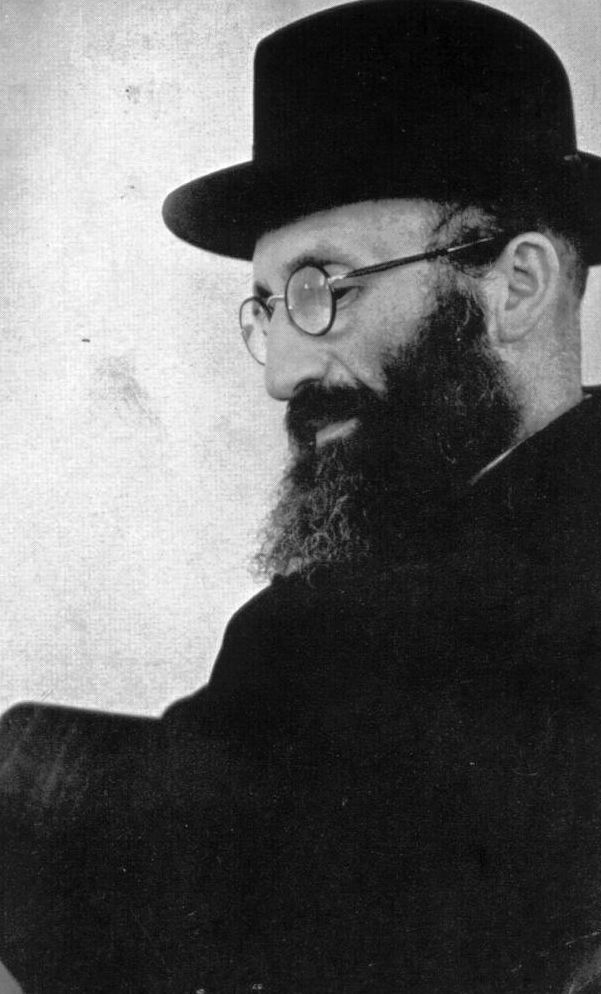
Rabbi Eliyahu Eliezer Dessler, overseer at the Ponovezh Yeshiva in Bnei Brak
Rabbi Dessler, the revered overseer of the Ponevezh Yeshiva, was a guide to thousands, the remnants of the giants of glorious Lithuanian Jewry, whose teachings were compiled in the popular series of books “Michtav M’Eliyahu” which have been used for decades as foundational books for morality, faith, and worldviews, and are the glory of every Jewish book collection around the world.
Rabbi Dessler was born in 5752 (1892) in Gomel (also known as Homyel) to his father, Rabbi Reuven Dov – a distinguished student of the “Saba Mi’Kelm,” Rabbi Simcha Zisel Ziv. His mother, Mrs. Chana Freidel, was the daughter of Rabbi Eliyahu Eliezer Grodzinski, the son-in-law of Rabbi Israel Salanter – the father of the mussar (morality) movement.
His uncle, the son-in-law of the elder Rabbi Eliyahu Eliezer, the great Rabbi Chaim Ozer z”l, called him as a child a “wonder child” and he was referred to as “Eli’yinka HaMatmid” (Eli the diligent student) in the famous yeshiva of Kelm, the one whose bitter end was written in letters of fire in the pages of the history of Lithuanian Jewry that came to the fore in the years of wrath. On Av 5, 5700/1940, the Lithuanian auxiliary police under the command of the Gestapo in Kovno, marched the yeshiva students and the Jews out of the town in order to murder them there. The yeshiva students marched in rows, with the prayer “Aleinu Le’Shabayech” (It Is Our Duty to Praise) on their lips. It is said that on the way, they sang the song “Ashereinu Ma Tov Chelkeinu” (We Are Happy. How Good is Our Lot). The Nazis murdered them and most of them were buried in a mass grave on the Gruzenbisky farm.
In 5674 (1914), upon the German’s conquest of Kelm, he returned to Homyel and studied at the yeshiva his father founded for war refugees. Homyel, a distinct chasidic city, had a great influence on Rabbi Dessler, and the writers of his history speculate that this is where his attachment to chasidic teachings came from, which was a rare phenomenon among the follows of the musar movement and in Lithuanian yeshivas.
In 5678 (1917), when the Bolsheviks expanded their world, his family lost its wealth (since faithful to the method of the Saba Mi’Kelm, members of the Dessler family did not take on any rabbinical positions, but earned livings from trade, and over the years G-d’s blessing poured out on the works of their hands, and they were awarded with greatness) and thus began the chapter of their wanderings.
The same year, after he married his rebbetzin, Bluma, his uncle, Rabbi Chaim Ozer, begged him to take a rabbinic position in the city of Vilna, but Rabbi Dessler refused and went to Riga to try his luck in commerce there. The attempt, unfortunately, was not successful, and for years he struggled to pay off his debts down to the last penny.
In 5687 (1927), Rabbi Dessler moved to England, where he spread Torah and musar to the students. Years passed, and he raised his only son and sent him to Vilkomir in Lithuania. On the eve of the outbreak of World War II, his wife and daughter went to Lithuania to visit family members, and to their dismay, the war that broke out closed in on them and they remained in Lithuania while Rabbi Dessler was in England.
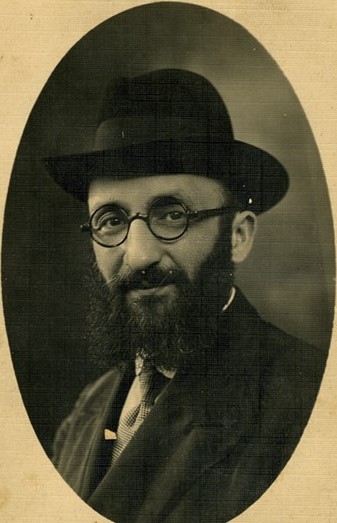
Rabbi Dessler as a young man
Rabbi Dessler, a man of emotion and sincerity, was left alone, and it is not difficult to describe his feeling in that time – a period of uncertainty and terror; piercingly concerned for those dear to his heart who were under siege and despair. But his sorrow and grief remained only in his heart. On the outside, he eschewed an abundance of peace and relaxation, and he served as a “wall of tears” for Eastern European refugees whose family members remained somewhere unknown.
There were no shortage of good reasons to sink into sadness and worry, but the rabbi, a man of faith and thought, a giant of morals and virtues, decided to sink into action. One question preoccupied his mind, the one that years later was a central paragraph in his well-known article “And let it be after the destruction”: for what purpose did the Almighty G-d leave us alive…
When he (Rabbi Dessler) was in England, he would always ask Him “why did I remain alive?” If he had returned home during the war, he would have been killed like everyone, this is saying that he obersved that it was decreed that all the Jews of Kelm (where his father-in-law Rabbi Nachum Ze’ev, the son of the Saba Mi’Kelm, lived) would pass to the Next World at a very young age, so why do we live? Why were we not privileged to be so holy like them, we probably have the possibility to do a good thing that only a living person can do.
“What can we do afterwards?” he said – to revive the dry bones, from the ashes to collect sparks and rekindle the light of the fire of Torah. He said, “if so, I don’t live for myself.” He was a lonely man with no family there. At the same time, a young man came to England as a refugee from the Holocaust, and someone else arrived, so he said, “let’s build a beit midrash (study hall) where they will study the Torah day and night as they learned before the Holocaust” (from the book “Ohalei Yaakov” about Rabbi Yaakov Edelstein).
Building Torah in Gateshead
In the year 5700 (1940-1), in the midst of the evil days, the rabbi founded a kollel (yeshiva for adult men) in Gateshead – for the refugees of the Torah world who were in England. The rabbi was already fifty years old at the time, he was not a particularly healthy and strong man, and by nature he was also modest and shy. These traits should have discouraged him to approach this project in the midst of the war, when London’s rich either ceased to be rich in the difficult times, or dispersed to the villages and suburbs from the terror of the bombings that destroyed London, or, those who did remain in their place and status, did not understand the benefit of the matter and did not appreciate at all what the new institution sought to instill in the younger generation.
The rabbi took upon himself this great burden with the belief that this is what G-d wanted from him at this time. From the things he carried out then, the buds of his method emerge, the one that came later in his books:
For those whose desire to teach comes from an inner degree of kindness, for him, the smaller the students, the greater the value of kindness, and the greater his devotion to his purpose. But the one who lacks inside, and in his ambition to teach is also involved “not for the sake of (G-d’s) honour” etc., the older the students are, the better, because he will be built up from the students…
For four years he dedicated himself to raising flocks of young Torah believers in the Gateshead Kollel, and did not take a single penny as a reward for his work. He earned his living in other ways, mainly from private study with students in various places to which he traveled frequently.
During these years when he was alone, far from his wife and children, he devoted himself to writing many letters to those who asked him something. His letters are wonderful and full of priceless content. His thoughts mixed from the teachings of musar, Kabbalah and chasidism was a cure for thousands in those days of disaster and destruction.
As is known, the rabbi was separated from his family during the Holocaust, and did not know at first what happened to them, and that they fled to distant Australia. After that, their contact was renewed by letters until the family was reunited at the end of the war. And here, in one of his conversations, the rabbi talked about Jacob our forefather, who recited the Shema prayer at his meeting with Joseph, as explained by the Sages, and they explained that Jacob did not want the love of his son to prevail in his heart over the love of G-d. And the rabbi said to his students: “When I receive a letter from my family in distant Australia, and I long so much to read their words and silence my longing for them, then I remember the words of the Sages and reply to my heart: ‘How righteous Jacob our forefather was…” (from his student, the genius Rabbi Yarkoni, Otzar HaChochma)
Over the years, Rabbi Dessler’s kollel became a spiritual Jewish center for English Jewry, from which institutions for boys and girls branched out; yeshivas and community centers. Rabbi Dessler’s circle of students and admirers kept growing, and he far exceeded the boundaries of Gateshead and its surroundings.
At some point, he learned that his wife and children had managed to escape from Lithuania to Australia. His joy knew no bounds, but the sorrow of distance and separation continued to oppress him until the end of the terrible war, when the family was reunited, and in 5708 (1948) he immigrated to the Land of Israel together with his wife, while his son and daughter settled in the United States.
In Israel, he served as the spiritual overseer of the Ponevezh Yeshiva, and herewith he acceded to the plea of the genius Rabbi Kahaneman z”l. In Ponevezh, he spoke and raised a glorious generation of students faithful to the Torah and musar.
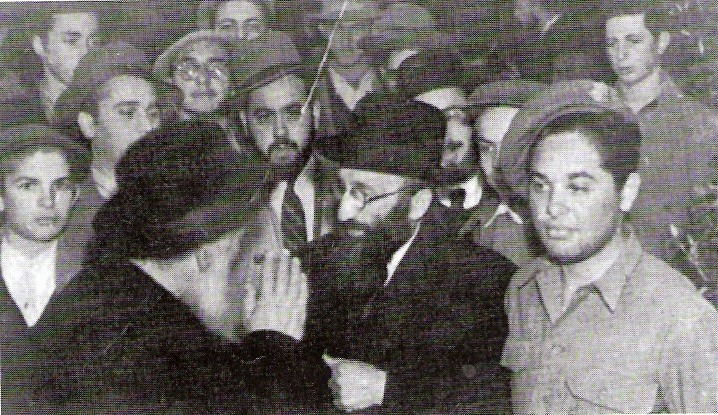
Rabbi Yosef Shlomo Kahaneman, the head of the Ponevezh Yeshiva, conversing with the spiritual overseer, Rabbi Eliyahu Dessler, while surrounded by the yeshiva students
Seventy years have passed since his passing on Tevet 25, 5714 (Dec. 30th, 1953), and still “his lips mumble in the grave,” for in the Torah tents of each congregation, the believers of the Torah meditate on the thoughts of the revered rabbi as written in the book “Michtav M’Eliyahu” with its five parts, and they build up their spiritual stature in the light of his organized and clear teachings.
As mentioned, Rabbi Dessler spent the years of the Holocaust in solitude, away from his wife and children. However, he maintained an unceasing momentum of spreading the Torah and doing kindness. In London, Manchester, Gateshead, and other cities and towns in England, Rabbi Dessler was a magnet for his students and those who listened to his lessons. Beyond the the words of Torah that they heard from him, he was a source of advice and guidance in all areas of life. He was consulted about educational, financial and medical problems. The rabbi was a support for people whose hearts were torn by personal conflicts of any kind, while he lived in complete uncertainty and had no idea what had become of his loved ones.
The genius Rabbi Naftali HaKohen Skovitzky z”l, the head of the Gateshead beit din (religious court), when he wrote about the character of Rabbi Dessler as reflected in his view during Rabbi Dessler’s years of living in his vicinity, described:
“His ancestors and his rabbis gave him the merit for extraordinary virtues and traits; a genius in the Torah, in Halacha (Jewish law) and in Agada (legends), broad knowledge in the visible and in the hidden aspects of the Torah, a deep thinker and source, a wonderful innovator, produced wisdom and a language of studies, clearly and directly explained the most profound things in a clear language for all, an expert and greatly knowledgeable in the wisdom of the world, and above all, he had a gentleness of spirit and nobility of the soul, was humble and loved kindness, respected mankind and desired goodness and prosperity for them; everyone who came in contact with him felt in him a devoted friend and a faithful brother…”
And these things are wonderful particularly in light of the period in question!
Rabbi Dessler’s thoughts on the Holocaust are spread out in his books, a bit here and a bit there. Many of the matters are also like the Oral Torah, handed down by his students.
In part four of Michtav M’Eliyahu, Rabbi Dessler wrote about “the secret of our time”:
The Secret of Our Time
“We are dumbfounded by the terrible destruction that has befallen our generation, and we ask ourselves, why did G-d do this… what is this big anger. But let’s see. The entire period preceding the destruction was a time of easing the bondage of exile over the People of Israel. One hundred and fifty years ago, the Jewish People were like outcasts and abominations among the inhabitants of the earth, and only in the last generations did the gentiles begin to make it easier for us to come and begin to compare our rights and our laws to their situation; and so the period of ’emancipation’ began. And in recent years they have already started talking about the Land of Israel and the possibility of giving us a place of residence and rest. These are the same gentiles who used to ridicule and despise us and considered as to be the lowest of lowest, and after all, the Land of Israel is also a holy land for them, and despite all this, G-d allowed their hearts to think that He would give it to us.”
“It is clear that the period of emancipation (emancipation – a process designed to ‘improve the situation of the Jews’, in return for benefiting from their skills. -Yaakov Rosenfeld) was summoned by G-d to serve as a preparation for us for the coming of the Messiah, and for this purpose the burden of exile was lightened upon us. Because the preparation for the days of Messiah requires a great deal of spiritual work from us to reach the level of redemption, and a state of frequent troubles and frequent humiliations is not capable of achieving the required drive to ascend. We found that this new enlightenment and the relief in our situation came so that we could use it for the purposes of holiness. And since we reversed the goal and instead of recognizing the hint from above to prepare for redemption out of joy and open-mindedness, we used the new situation to interfere with the gentiles and learn from their actions, the well-known danger of preparing for holiness that does not reach its purpose, as we explained above. (And the fact that the destruction did not happen until now, even though the process of assimilation had been increasing for a long time, is because G-d postpones His anger and does not bring the calamity until after the destruction has been fulfilled and there is no longer any hope that the effect will bring about a correction. We also found in the First Temple that stood for a long time and ten miracles still occurred there even after Menashe set up an image in the Temple.) [And if after the terrible destruction there is a period of grace and a time of grace comes again, we should not change our attitude but rather recognize the hints from above and hold on to the enlightenment to repent to complete repentance.]” (Michtav M’Eliyahu, part 4 p. 124)
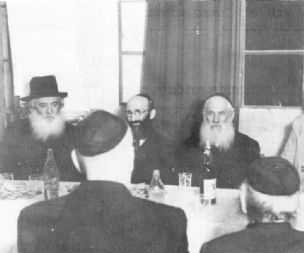
The heads of the Ponevezh Yeshiva, Bnei Brak, sit for a seudat mitzvah (meal eaten after performing a commandmant). From right to left: Head of the yeshiva, Rabbi Yosef Shlomo Kahaneman; the supervisor, Rabbi Eliyahu Eliezer Dessler; and Rabbi Levi Grossman
And It Will Be After The Destruction
His article “And It Will Be After The Destruction” was a fertile ground for research and study on the proper religious view of the events of the Holocaust.
First, he wrote about what we lost as a people; in heartbreaking words he described what the Jewish People had and what they lost, but his conclusion, about what is imposed on us “after the destruction”, deserves contemplation.
“One simple thing,” Rabbi Dessler began and said: “Without any innovation, I will write it down here, take heed to your hearts, dear children, and hear me carefully. Not all generations are like our generation.
It is a generation of destruction, in our sins
Will we understand what a generation of destruction is?
No.
We will not understand and we will not achieve.
Nor will we believe that it is possible!
But..
After all, it is true!
The wealth we had, a sword and we are gone!
Although the painting of the rich past is still as if alive before our eyes – it is nothing but a past that recedes and goes away, but in the present, it is gone!
The present is empty!
The same spiritual wealth, the same air of yeshiva, the same true ambition, the same learning, the same piety, the same cordiality.
All these are no longer with us.
Gone!!!
Our holy ones have gone to eternal rest, to a place where destruction will no longer reach; But although the holiness joined them in their death, the heartiness also died with them.
The Shechina (G-d’s presence in the world) has left our midst
Our sons will not be seen with us. And if we tell them what we saw, what we lived though, it will be a story for them and not a reality.
We have not yet seen the revelation of the Shechina in the hearts, but how will they see it…
Following his words, Rabbi Dessler wrote:
Let’s think:
Why did we stay alive?
Why did God save us?
(…)
Let us live in order to remember and revive the holiness in the places of lowliness
We, the survivors…
A remnant that suvived the whole destruction
And it will be after the destruction
What’s next for us?
Should we also kill the great sparks of life within us – the sparks of spiritual life?
No!
No!
No a thousand times!
We give all our souls in favor of saving the spirit!
All our lives will only be for the building of the destroyed.
Only for the revival of the dead!
We have no interest in anything other than that.
We have still seen the greatness of holiness, who will return and live if not us?
There is nothing else in front of us
There is nothing comparable in our eyes
One is our heart
And all aspire to God for the revival of spiritual life
The spirit of the Torah will not die in our generation in any way!
And if the destruction also increased
We will all raise the building together!
Let us know clearly that if we surrender our souls to Him as we should, our sons will also see the holiness as we saw
And they also knew the revelation of the Shechina in their hearts.
Our children will still know the spirit of Israel that comes in the yeshiva, they will still be immersed in it, they will still breathe in it
And there will be more in the life we lived!
(…)
Who will be able to bear the feeling of the death of the hearts, the feeling of the departure of the inner life?
Indeed! It is still in our hands! True self-devotion is required
True
Neither feigned nor pretended
Come, let us build ourselves, build our sons
Build Torah institutions
Build yeshivas
Return the hearts of fathers and sons to the Torah, we will work hard
And G-d will make us succesful
Come. We will be strengthened and encouraged; Let’s go up, onwards, up!
Don’t back down.”
Regarding the Faith of the Sages
One of his well-known letters is the one printed in a Michtav M’Eliyahu under the title “Letter concerning the Faith of the Sages”, which was addressed, apparently, to one who made it difficult to follow the leadership and instructions of the great and righteous people of the generation on the eve of the Holocaust.
In his answer, Rabbi Dessler took a much more forceful style than usual, this in view of the importance of clarifying the alleged matter that the haters of the religion often waved at him, and thus he wrote, among other things:
“From His Honour’s words, I see that he believes that all the great Jewish men whose deeds were for the sake of heaven, and the genius righteous people together, who without a doubt in all their judgments and rulings, G-d stood with them, as in the past generation with the Chafetz Chaim z”l, and the genius Rabbi Chaim Ozer z”l, the genius Rabbi Chaim Brisker z”l, and the genius Rabbi Baruch Ber, and many more, whose smallness is greater than our achievement, and what about in the generation before them, like the genius of Israel and his holiness, Rabbi Yisrael of Salant z”l, and other geniuses and righteous people of his generation who accompanied him, will all make a complete mistake – G-d forbid. It will not be like that in Israel. It is forbidden to hear such things, let alone say them. If I hadn’t understood what was heard from others, who are called Bnei Torah (religious men) and who kick their wives and blaspheme G-d, such things, because then I would not have answered him anything; But I knew that his heart was honest, except that he received such admonitions from the outside, therefore, in addition to the greatness of our friendship, I said I would give it a night, and I would reply to him with clear words.”
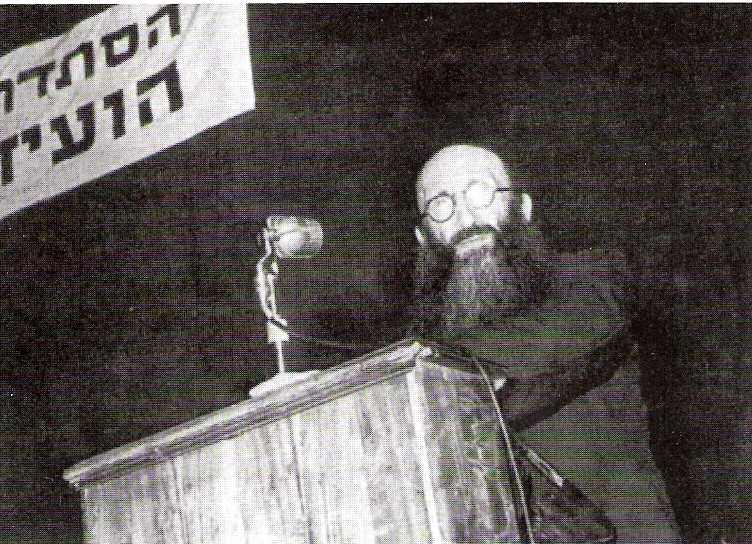
Rabbi Eliyahu Eliezer Dessler speaks at a conference of the Agudath Israel youth movement
“First of all, I would like to say that I have had the privilege of knowing some of these geniuses personally, and you have seen them at the gatherings for matters of the Jewish People, such as the Chafetz Chaim z”l, Rabbi Chaim of Brisk z”l, and the genius Rabbi Chaim Ozer z”l, and I can honestly say to him that even to reach infants like us, their openness was shocking, and the depth of their minds would descend and pierce to the very abyss; and there was no possibility for a person like us to understand them. This and another thing: those who saw their meetings, saw with a sense that, at any rate when they thought their thoughts and deepened their minds for the sake of Heaven in the affairs of the Jewish People, it was a wonderous sight to see the magnitude and depth of the feeling of responsibility that was on their faces, in a way that those who did not see it did not ever see a feeling of responsibility, and anyone who had the privilege of standing before them at such an hour, it was clear to him that he saw that part of the Shechina was in their hands, and that the ruach hakodesh (Divine force) sang in their company. It is really appropriate to say ‘the one who distinguishes between the holy and the profane’ about the difference between their gatherings and the gatherings we are used to. Certainly he knows Rabbi Elchanan (the words were written in the midst of the war when the fate of Rabbi Elchanan Wasserman z”l was not yet known) who recounts the heroic deeds of the Chafetz Chaim z”l. Please know, his honour, because Rabbi Elchanan is truly very great, and his words should not be disregarded, let alone rejected, even because of what we children think we see with our senses. And the Sages have already told us to listen to the words of the wise rabbis, even if they tell us that the left is the right, and not to say that they must have been wrong because I, the little one, see their mistake with my sense, but my sense is null and void, it is like the dust of earth (i.e. worthless) compared to the clarity of their intellect and their Heavenly assistance. There is no court that can overturn their court unless it is greater than it in wisdom and reason, and without that, it is close to what they would pretend to be a sense but is actually imagination and ill-will. This is the opinion of the Torah in the scope of the faith of the wise rabbis.”
The Destruction of Torah during the Holocaust – From the testimony of his son-in-law, Rabbi Eliyahu Yehoshua Geldzahler z”l in his book “Emunat Yehoshua”
“I once heard from a scholar in a musar study group who said in a loud voice, that in the years of rage, apart from the fact that six million of our nation, the Jewish People, were killed and slaughtered with great cruelty, the Torah was also destroyed! How many yeshivas, how many great Jewish influencial people and rare manuscripts, and he said that the destruction of the Torah was due to the gratuitous hatred of the Torah, and the thinkers of it; in this country they didn’t learn Torah from another country, and this group didn’t learn Torah from another group, and he said, gratuitous hatred of the Torah caused it, the great destruction of the Torah. And hit the table regarding this a few times. There is a pattern of gratuitous hate of the Torah. And I once heard him say to me, when he gave a talk in front of chassidim, he told them words of musar, and when he gives a talk in front of yeshiva students, he tells them about chassidism, this is a great opponent of this divisiveness…”












